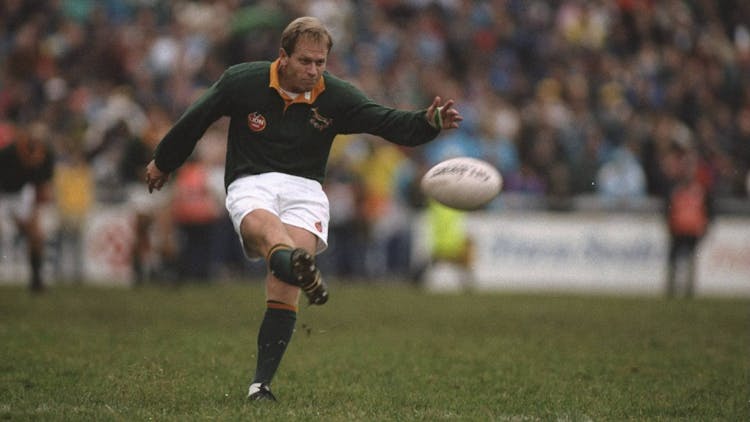Rugby News, Interviews and Match Reports
Welcome to your ultimate source for rugby insights. Whether you are a fan, a player, or a curious newcomer, you will find something to inform you here. We offer a variety of rugby content, such as exclusive interviews with players, coaches, and experts, opinion columns on the latest issues and trends in the game, and match analysis and previews from our team of writers and pundits.
Welcome to your ultimate source for rugby insights. Whether you are a fan, a player, or a curious newcomer, you will find something to inform you here. We offer a variety of rugby content, such as exclusive interviews with players, coaches, and experts, opinion columns on the latest issues and trends in the game, and match analysis and previews from our team of writers and pundits.

Written by: Louis Hobbs
(Senior Sports Writer)
Last updated: 2024-04-23

Exclusive: Rising star Tiaan Jacobs talks breaking through as first overseas Junior Springbok pickup
Disappointment, hope, emotional happiness. Tiaan Jacobs describes his journey to joining his national rugby team.

Exclusive: Danny Care pleased with England’s progress, believes the team will become “frightening”
Still in the game, but at a club level, Danny Care believes the England team is on the right path forward.

Exclusive: Cecil Afrika on Shaping the Future of Women's Rugby Sevens
In a SportsBoom.com exclusive, Rugby Sevens legend Cecil Afrika opens up about coaching the South African women's team, as they strive for Olympic glory and advocate for gender equality in sports.
By Neil Goulding
March 6th, 2024
Rugby Opinions & Guides
The Global Spread of Rugby Union
Rugby union, originating in the Home Nations of Great Britain and Ireland, rapidly expanded worldwide, gaining popularity in Australia, New Zealand, South Africa, and France. It's now a major sport in Great Britain, Ireland, France, Georgia, Oceania, Southern Africa, Argentina, Italy, Japan, South America, the United States, Canada, and Eastern Europe. Influenced by the British Empire's expansion and French advocates, rugby union is the national sport in Fiji, Georgia, Madagascar, New Zealand, Samoa, Tonga, and Wales, symbolizing its global cultural impact.
Key Events in Rugby Union History
The first international rugby match was played between Scotland and England in 1871. The Rugby World Cup, inaugurated in 1987, occurs every four years. Annual competitions include the Six Nations Championship in Europe and The Rugby Championship in the Southern Hemisphere.
Rugby Union Scrum Explained
A scrum in rugby union restarts play after minor rule breaches. Eight forwards from each team bind in a 3–4–1 formation and contest for the ball. The scrum-half rolls the ball into the scrum, and the hookers from each team use their feet to hook the ball back. The team that gains possession can either push forward or pass the ball to resume open play.
Early International Rugby Union Milestones
The first international rugby match was played between Scotland and England in Edinburgh on March 27, 1871, with Scotland winning. The Home Nations Championship, involving Ireland and Wales alongside England and Scotland, began in 1883, the same year the first rugby sevens tournament, the Melrose Sevens, was held.
Is rugby similar to football?
Rugby and American football share some similarities but also have notable differences. Both are team sports that involve carrying, passing, and kicking a ball to score points, and they both have physical contact and tackling elements. However, their rules, play style, and equipment differ significantly. Here's a brief comparison:
- Origin: Both sports have roots in early forms of football played in the UK. Rugby is directly descended from these games, while American football developed from a combination of rugby and soccer.
- Ball Shape: Both use an oval-shaped ball, but the rugby ball is more rounded and slightly larger.
- Field Size: A rugby field is larger than an American football field. Rugby fields are up to 100 meters long and 70 meters wide, not including end zones, whereas football fields are 100 yards (91.44 meters) long and 53.3 yards (48.8 meters) wide.
- Number of Players: Rugby teams have 15 players (or 7 in the sevens variant), while American football teams have 11 players on the field at a time.
- Tackling and Physical Contact: Both sports involve significant physical contact. Rugby tackling tends to emphasize wrapping and bringing the opponent to the ground without protective gear, whereas American football uses more blocking techniques and players wear helmets and pads.
- Scoring: Both sports score through a method of 'touchdowns' (tries in rugby, worth 5 points) and field goals (worth 3 points). However, American football also has the option of a 1-point conversion after a touchdown and a 2-point conversion option, while rugby has a 2-point conversion kick after a try.
- Passing: In rugby, players can only pass laterally or backward, while in American football, forward passes are a key part of the game.
- Play Structure: Rugby is generally more fluid, with continuous play and fewer breaks. In contrast, American football is characterized by a series of downs and is more stop-start in nature.
- Equipment: Rugby players wear minimal protective gear, typically just mouthguards and sometimes soft padding. American football players wear helmets, shoulder pads, and other protective gear.
- Game Duration: Both games last around 80 minutes, but the way time is managed differs. Rugby has two 40-minute halves with continuous clock, while American football has four 15-minute quarters with a clock that stops frequently.
Where is rugby from?
Rugby is believed to have originated at Rugby School in Rugby, Warwickshire, England, in 1823 when during a game of football, William Webb Ellis decided to pick up a ball and go with it. This act is said to have inspired the creation of rugby football. Although there is very little evidence to support this theory, the Rugby World Cup Trophy is now named after William Webb Ellis.
Is rugby harder than football?
Both rugby and football are highly physical sports that require a great deal of athleticism and endurance. However, there are some key differences between the two sports that make rugby generally considered to be more physically demanding.
- Contact: Rugby is a full-contact sport, meaning players are allowed to tackle each other with their arms and bodies. This results in a higher level of physical contact than in football, where players are only allowed to tackle with their shoulders.
- Gear: Rugby players wear minimal protective gear compared to football players. They wear mouthguards, shoulder pads, and sometimes knee pads, but they do not wear helmets or other protective gear that covers their heads or bodies. This means that rugby players are more exposed to injuries than football players.
- Pace: Rugby is a faster-paced sport than football. The game is played with continuous action, and there are no stoppages for commercial breaks. This means that rugby players are constantly moving and expending energy.
- Skill set: Rugby players need to be versatile athletes who can excel in a variety of skills, including running, passing, kicking, tackling, and rucking. Football players, on the other hand, typically specialize in a few key positions.
- Fitness: Rugby players need to be in excellent physical condition to withstand the rigors of the game. They need to be strong, fast, and have a high level of endurance.
As a result of these factors, rugby is generally considered to be a more physically demanding sport than football. However, both sports are challenging in their own ways, and it is ultimately up to the individual athlete to decide which sport they prefer.
Here is a table summarizing the key differences between rugby and football:
| Feature | Rugby | Football |
| Contact | Full contact | Limited contact |
| Gear | Minimal protective gear | Helmets, shoulder pads, etc. |
| Pace | Faster-paced | Slower-paced |
| Skill set | Versatile athletes | Specialized athletes |
| Fitness | High level of fitness required | Moderate level of fitness required |
Differences between rugby and football
Is rugby older than football?
Yes, rugby is older than football. The earliest forms of rugby-like games date back to ancient Greece, while the first written rules of rugby were established in 1845. Football, on the other hand, traces its origins to the 19th century.
Dive into the Heart of Rugby with SportsBoom
Whether you're a seasoned pro or a newbie just picking up the oval ball, we've got something for everyone.
Hot off the Press: Stay ahead of the game with our lightning-fast news coverage. From breaking transfer rumors to match analysis and post-game reactions, we'll keep you in the loop every step of the way. Think of us as your personal scrum machine, delivering all the latest news straight to your feed.
Exclusive Access: Go beyond the headlines with in-depth interviews featuring the biggest names in the sport. We don't just talk to the usual suspects; we delve into the minds of rising stars, breakout talents, and legendary figures alike. Get the inside scoop on their training regimes, game strategies, and personal perspectives that you won't find anywhere else.
Expert Opinions: Rugby is a sport of passion, and sometimes, a little healthy debate. Our team of seasoned journalists and former players aren't afraid to ruffle feathers with their insightful and thought-provoking opinion pieces. From hot takes on controversial calls to deep dives into tactical nuances, we spark the conversations that get rugby fans talking.
Beyond the Pitch: Rugby isn't just about what happens on the field. We explore the wider world of the sport, delving into its history, culture, and impact on communities around the globe. Discover fascinating stories about unsung heroes, grassroots initiatives, and the unique traditions that make rugby so special.
So, what are you waiting for? Take a virtual tour of the world of rugby with SportsBoom. Get ready to tackle the latest news, dive into exclusive interviews, and engage in conversations that will keep your rugby spirit soaring!
Remember, at SportsBoom, we don't just cover the game, we live it. Come join the ruck!




